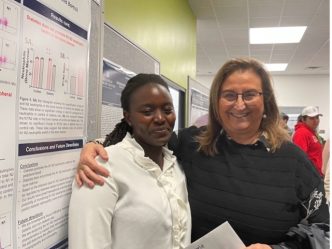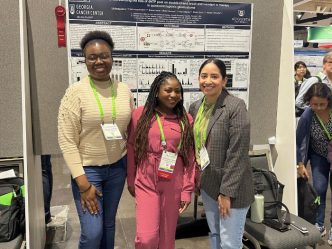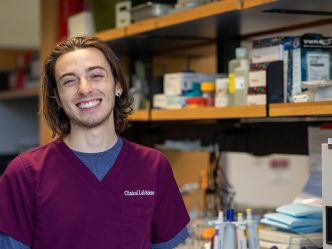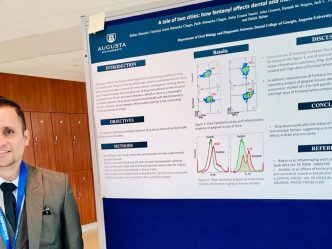Pursuing a PhD is a transformative journey, and for Desmond Moronge, a recent graduate from the Physiology PhD program, it was a path shaped by his Kenyan roots and unwavering determination. In this interview with Francis Anazodo, Dr. Moronge reflects on his graduation day, how his Kenyan heritage influenced his academic journey, and his experiences navigating graduate school in the U.S. He shares the challenges he overcame and offers valuable advice for current PhD students. Join us as we explore his inspiring story of resilience, ambition, and the power of education to create new opportunities.
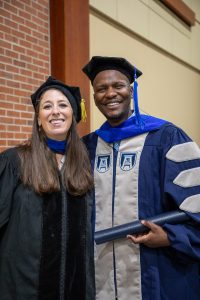
Congratulations on earning your PhD! How would you describe your feelings on graduation day?
Thank you, Francis! Graduation day was amazing. It felt like the culmination of a long and interesting journey. There were moments that felt overwhelming, but reaching that final day was like seeing all the hard work, late nights, and sacrifices come together. It was a mix of pride, relief, and gratitude—grateful for the support along the way and the opportunity to contribute to the field. It was emotional and surreal to realize that years of work had led to this milestone. It’s not just the end of a chapter but the beginning of a new one, and that’s exciting.
Your academic journey began in Kenya before you arrived in the U.S. for your PhD program. How did your formative years in Kenya prepare you for what was to come?
My formative years in Kenya shaped how I approach challenges and learning. Education is highly valued, but resources can be limited, so I learned to be resourceful and creative in problem-solving. Whether it was working with fewer materials or finding innovative ways to collaborate, that mindset became key in my academic journey. The community-focused culture instilled in me a strong sense of support. Teachers, peers, and family were sources of inspiration, and their belief in the power of education helped me develop a growth mindset. After earning my bachelor’s in pharmacy, I worked as a pharmacist, which sparked my curiosity for further learning. When I arrived in the U.S., my background in Kenya gave me the confidence to embrace new opportunities and challenges. That resilience continues to influence my research and collaboration.
Were there moments during your PhD journey when you wanted to give up? If so, how did you push through those challenges?
Yes, absolutely! There were times when giving up seemed easier. Experiments didn’t work despite all the effort, and grants got humbling feedback. In those moments, it was about perspective. The mentorship I received from Dr. Faulkner and Dr. Sullivan was crucial—they guided me with patience, positivity, and honesty about the struggles of a PhD journey. Their support helped me push through the tough times. The graduate school community was also important. Talking to friends and colleagues made me realize that everyone faces similar challenges. That solidarity helped me trust that persistence would pay off. In the end, those challenges became opportunities to learn and grow, and with the right support, I was able to keep going.
Can you briefly tell us about the research you are passionate about and for which you are now Dr. Desmond?
It’s hard to condense the research I’ve been passionate about into a brief response, especially when I had to write over 150 pages of a thesis on it! In the broader context, my work has been tied to Dr. Faulkner’s lab, focusing on women’s health, and Dr. Sullivan’s lab, where we study acute kidney injury (AKI) in young females. I primarily examine mechanisms contributing to adverse outcomes after AKI, especially during pregnancy and aging. While women were thought to be protected from AKI, our research reveals a more complex picture. Women may have a lower overall incidence of AKI, but complications arise when women with a history of kidney injury recover and later face issues during pregnancy. This area has been underexplored, and our work aims to understand how prior AKI impacts maternal and fetal outcomes, ultimately mitigating risks for women.
What was the most remarkable day of your graduate school experience?
That’s a tough question, because honestly, there were so many remarkable days throughout my graduate school experience, it’s hard to pinpoint just one. But if I had to highlight the best moments, the most memorable moments were traveling for conferences and scientific meetings. Presenting my research and networking with other scholars were highlights. And of course, the free food events organized by the graduate school—like the Grad Grill—added a nice balance to the intense parts of the journey. Grad school isn’t just about research; it’s about building a community and enjoying the experience together.
Looking ahead, do you see yourself contributing to academic research, working in industry, or pursuing a different field entirely?
Ah, the million-dollar question! Looking ahead, I see myself contributing to the academic research setting. I feel a strong pull toward academia because of the impact it can have, especially for people from Kenya. Teaching and inspiring the next generation of scientists, particularly those who may not have seen academia as a viable path, is fulfilling. I want to show others that it’s possible to succeed, even with limited resources. I’ll be working with Dr. Sullivan’s team as a postdoc, which will help me become more independent in my research and prepare for a faculty position. However, I’m open to opportunities and evolving ideas, whether in academia, industry, or another field. I’m passionate about making a meaningful difference and growing as a researcher. 2
How can current PhD students, including members of the BSA, maintain balance and stay motivated during tough times?
Maintaining balance during tough times is one of the biggest challenges of a PhD. It’s important to recognize that setbacks, like failed experiments or grant rejections, are part of the process. You’re not alone—talking to friends and sharing experiences helps ease the feeling of isolation. The BSA community is a great place for support and motivation. Also, seek out supportive mentors who can provide guidance. And don’t forget self-care. Prioritize your well-being, stay connected to your community, and hold on to your purpose. With the right mindset and support, you’ll find the strength to push through. Every step forward is progress.
 Augusta University
Augusta University
